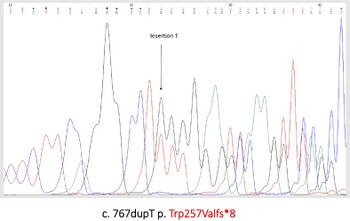Antithrombin III deficiency
| Antithrombin III deficiency | |
|---|---|
| Other names: ATIII deficiency | |
Antithrombin III deficiency (abbreviated ATIII deficiency) is a deficiency of antithrombin III. This deficiency may be inherited or acquired.[1] It is a rare hereditary disorder that generally comes to light when a patient suffers recurrent venous thrombosis and pulmonary embolism, and repetitive intrauterine fetal death (IUFD).[2] Hereditary antithrombin deficiency results in a state of increased coagulation which may lead to venous thrombosis.[3] Inheritance is usually autosomal dominant, though a few recessive cases have been noted.[4] The disorder was first described by Egeberg in 1965.[5] The causes of acquired antithrombin deficiency are easier to find than the hereditary deficiency.[3]
The prevalence of antithrombin deficiency is estimated at ~0.02 to 0.2% of the general population, and 1-5% of patients with venous thromboembolism.[6] There is an elevated risk of thrombosis, whereby 50% patients with AT deficiency were found to have venous thromboembolism by age 50.[6]
Signs and symptoms
The presentation is determined by the location of the clot, that is if it is located in the leg (DVT) them swelling, pain, and redness will occur[7]
Cause

The cause is due to mutations in the SERPINC1 gene, which provides a blueprint to create a protein called antithrombin [8]
Diagnosis
A clinical suspicion for antithrombin deficiency can be made in patients with: 1. recurrent venous thromboembolic disease, 2. childhood thrombosis, 3. thrombosis in pregnancy. Testing for antithrombin activity can confirm deficiency if the levels are less than 70%. Deficiency can result from genetic predisposition or from acquired causes such as: acute thrombosis, disseminated intravascular coagulopathy, liver disease, nephrotic syndrome, asparaginase deficiency, oral contraception/estrogens. Genetic testing for abnormalities of the SERPINC1 gene can be done to evaluate further.[6]
Management
In patients with antithrombin deficiency, they may develop resistance to unfractionated heparin, especially with continuous infusions. If large quantities of unfractionated heparin are required e.g. greater than 35000 units per day, this would point towards resistance. Antithrombin concentrates have been used, though with risk of bleeding at large doses of unfractionated heparin. Low molecular weight heparin at full weight based dosing is effective; however, measurements of peak anti-Xa levels may not reflect anticoagulant effect. Vitamin K antagonists, and direct oral anticoagulants, including anti-Xa inhibitors and thrombin inhibitors have also been used, though data is limited.[6]
See also
References
- ↑ Găman AM, Găman GD (2014). "Deficiency Of Antithrombin III (AT III) - Case Report and Review of the Literature". Current Health Sciences Journal. 40 (2): 141–3. doi:10.12865/CHSJ.40.02.12. PMC 4340457. PMID 25729597.
- ↑ Kurman RJ, ed. (2002). "Chapter 23: Diseases of the Placenta". Blaustein's Pathology of the Female Genital Tract (Fifth ed.). pp. 1136–7.
- ↑ 3.0 3.1 Khor B, Van Cott EM (December 2010). "Laboratory tests for antithrombin deficiency". American Journal of Hematology. 85 (12): 947–50. doi:10.1002/ajh.21893. PMID 21108326. S2CID 1435184.
- ↑ Online Mendelian Inheritance in Man (OMIM): 107300
- ↑ Egeberg O (June 1965). "Inherited antithrombin deficiency causing thrombophilia". Thrombosis et Diathesis Haemorrhagica. 13 (2): 516–30. doi:10.1055/s-0038-1656297. PMID 14347873. S2CID 42594050.
- ↑ 6.0 6.1 6.2 6.3 Pabinger, Ingrid; Thaler, Johannes (2019-12-26). "How I treat patients with hereditary antithrombin deficiency". Blood. 134 (26): 2346–2353. doi:10.1182/blood.2019002927. ISSN 0006-4971. PMID 31697819. Archived from the original on 2023-02-13. Retrieved 2023-03-02.
- ↑ "Antithrombin Deficiency - Symptoms, Causes, Treatment | NORD". rarediseases.org. Archived from the original on 10 December 2022. Retrieved 30 June 2023.
- ↑ "Hereditary antithrombin deficiency: MedlinePlus Genetics". medlineplus.gov. Archived from the original on 2 June 2023. Retrieved 30 June 2023.
External links
| Classification | |
|---|---|
| External resources |